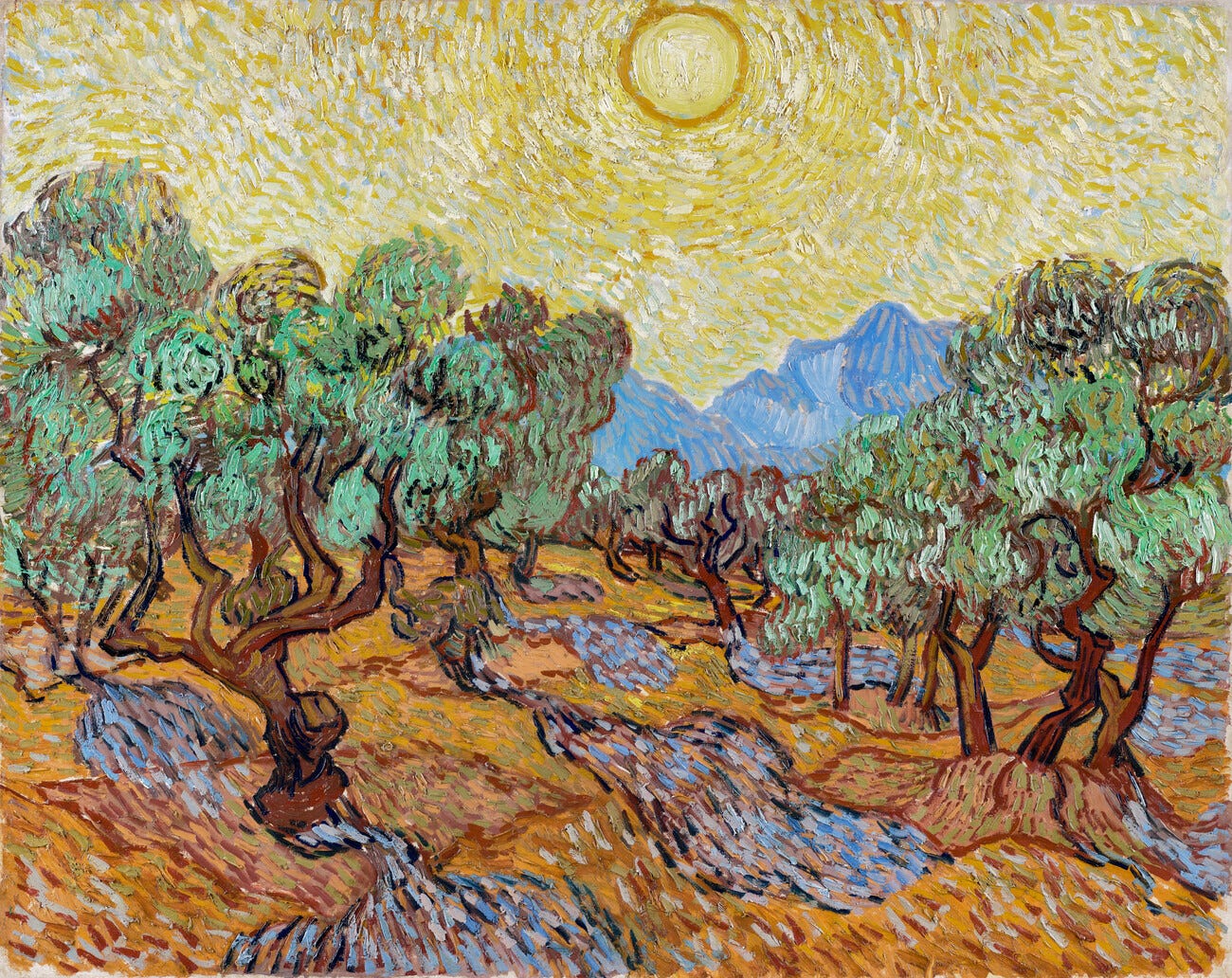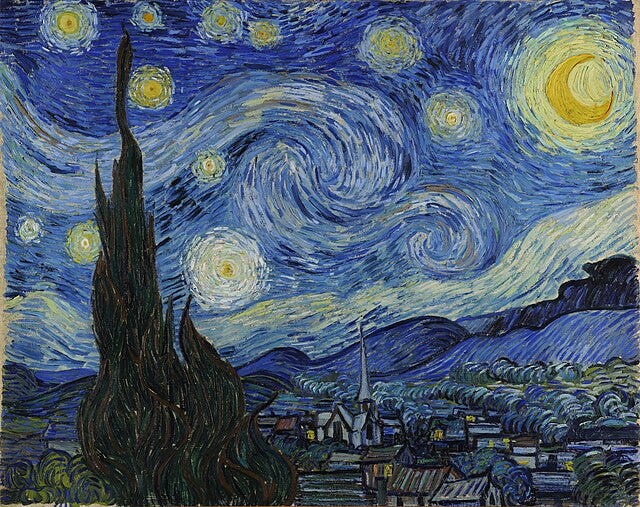Coming off of all social media (except for substack, of course) has been revelatory for a number of reasons, but perhaps most of all for the unexpected way my social sabbatical has shown me just how much I was trying to live my real, everyday, multidimensional life within the confines of an imaged instagram square.
It dawned on me the other evening, when I was in one of my tidying frenzies. I was troubled by the way the dining table no longer centred in the window to accommodate my daughter’s new adapted high chair. It didn’t look right somehow.
But just as quickly as I caught myself in this strange rapture of compulsive orderliness, it also dawned on me how mad that thought really was. Who did this not look right for? Who do I actually think is looking at me right now? Who do I think is really caring about the angle of my dining table in the window?
Olive Trees - Vincent Van Gogh
We managed to catch the Van Gogh exhibition in early January before it moved on, and by which point I was already deep into my retreat from social media. I remember when paintings that hung on the walls of a gallery came with the forbidding crossed out camera icon that said no photos. At the risk of sounding like an old lady, boy do I miss those days. It seems, however, as though social media and the lie of virality overcame even the great masters, because now it’s a free for all.
I watched, incredulously fascinated, as people, mostly, I would guess, under 30, walked up to one of Van Gogh’s works, their phone meeting it long before their eyes, if that actually happened at all. A picture was taken, which, even on the latest iPhone, can’t truly capture the majesty of Van Gogh’s feverish brush strokes and hallucinogenic colourscapes. Taking a photograph of such a painting is a bit like trying to take a photo of the moon; you just won’t be able to capture it, no matter how hard you try (or filter).
Said photo, without a second glance, then went swiftly to Instagram, Tiktok, Snapchat or all of the above, with a tag of the gallery (as if it needs the promotion from a 24 year old micro influencer) and location pin dropped. A digital ‘(insert name) was here’, but for intellectuals.
Who is this for?
Truly, who is this for?
It’s the same as going to a concert and filming all of it and therefore feeling none of it. You might be able to watch the footage back on your stories, but it will always be tinged with the lens of ‘not-enoughness’ and anxiety, for example, checking back to see who has seen your story, wondering why that person has watched it, wondering why the person that you really wanted to watch it, hasn’t. Projecting your assumptions onto their imagined responses and losing your true sense of self entirely in the process.
This is a good moment to mention that I am not above any of this. Why do you think I needed to come off social media?
What I am trying to do, however, is rise above the pervasive madness of it all.
Going back to my dining table, I believe that the perfectionist, competitive, not real culture of social media is so ingrained in my bones that I thought that I was viewing my front room through a screen for a moment. In fact I know I was. It’s taken me just over three weeks of much less phone time to realise just how much I was, and probably still am, living in my phone.
I sometimes wonder, especially as a mum, who will one day have to set proactive digital boundaries for my kids, if phones are just the new TVs. I remember TV being banished for a week once when I didn’t complete my homework, and it worked - I am an insufferable deadline meeter forever more (thanks Mum and Dad). Growing up, TV was a treat and definitely something that had limits on it, but with phones it doesn’t seem to be that easy.
Television, although its content can easily be inappropriate for young eyes, is largely one way, whereas a phone, especially a smartphone, is interactive, and infinitely so. You only have to turn on your phone and see all the multicoloured apps eyeballing you and vying for your already compromised attention to know that your mind is no longer your own from that point on, and then, within those apps, tiny though they may appear on the screen, live entire worlds, universes even, of conflict and comparison; projected worlds that become your own.
Because of this, nobody knows who they are anymore. It really is the blind leading the blind.
In my current season of life, as a new mother, and one facing many, many challenges; far more than most (I’m comfortable with saying that now), I find the most pernicious thing about social media is the lies it makes us tell.
In trying to have a perfectly curated front room, with a dining table at its centre, evoking precision and alignment, I am lying. I am lying to myself about our ever moving state of home, which is sometimes our actual home, but a lot of the time it is hospital. I am lying in my belief that how I put together a space is the most important thing that others know about me. I am condensing the absolute ocean of feelings and waves of joy, grief, fear, empowerment, multiple truths that reside within that ocean into an aesthetically pleasing vase, which might look nice, but can never capture the enormity of my life. Chaos and trauma are also like the moon; they too cannot be captured or filtered.
Van Gogh, although posthumously, like so many of the true greats, is endlessly famous and known, and loved. I am sure that so many people, especially those who come and just take pictures of his works, before moving on to the next thing, don’t even know why they love him.
I think it is because when he painted, he painted truly what he, and he alone, saw. He painted acid trips without (I think?) being on any acid. Fun side fact here though: DMT, the potent component in psychedelics, has been found to be naturally occurring in the mammalian brain. That’s a whole other post, and I am not a neuroscientist, but one wonders if such a thing was a cerebral occurrence for Vincent.
He paints not only from his own mind, but from his soul. I think people who view his work wish they could see the world like that. I think his work is proof that actually, everyone has the capacity to see the world like that, but very few are brave enough to go there. Truth tellers elicit more truth telling, and social media and its smoke and mirrors are the antithesis of that truth telling process.
As a sober person myself, I am not exploring psychedelics in my mission to undo the lies of a life digitalised, but I am finding more and more pockets of real, actual quiet in which I experience the truth. With practice, and time away from screens, it sometimes only takes a couple of minutes in meditation. It can be a simple phrase that gets dropped gently into the now much deeper well of my imagination; an idea that might get a chance to actually grow, because it has landed in my mind and mine alone, free from any external pressures, comparisons or conformities. The more I operate from this place, the more I can live honestly, which allows me to make meaningful connections where once I perceived comparisons and separations.
Being a mother, especially a first time one, is a transformative experience, but transformation can also be incredibly lonely. Trying to live out motherhood through the illusion of social media made it a hell of a lot more lonely, even when I actually found the wonderful corner of the internet that is ‘medical moms’; I was still comparing, projecting and expecting.
Real life, and the truth are away from all that. This platform is still the internet, but it feels closer to the truth for me. The longer I stay away from the mirage of perfection, the closer to the truth I get and the further away I get from being able to participate in exchanging lies about perfect lives, with people that don’t actually exist, not on this plane anyway.
For now, I’ll be here at my little dining table, that doesn’t meet the symmetry of the room its in, writing away, until I get to the truth of the matter.






